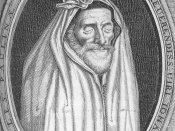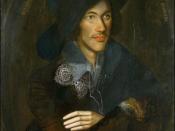Just as there are a thousand parts that make up the whole of the "tradition of British literature," there are a thousand different angles from which to view that tradition. One can look at literary styles, at forms and rhymes and media, and trace their evolution as they fall in and out of favor. A historical perspective is possible, digging to discover how a culture effected literature and how that literature in turn changed society. You may pick a theme, a subject, a particular story, and can follow its wavy path as it hikes its way from writer to writer. And you can choose a focus, one poet out of the many, and see how his or her trail intersects these other angles. Considering the enormity of his ups and downs, his changing place within the English canon, the works of John Donne make a particularly revealing place from which to view the tradition of British literature.,p> As far as the poetry of John Donne is concerned, it lies squarely within the English tradition. The reader can be positive that Donne was interested in the past both by what he followed and, more importantly, by what he rejected (and often ridiculed). He took some of the Renaissance ideas that had been overused and reinvigorated them. Many of his poems deal with conventional Petrarchan subjects: love, sadness, separation. Yet Donne turns tradition upside-down, or inside-out, by employing the elaborate conceit and by intellectualizing emotion, traits that would become his trademarks. When he turned to the sonnet, which had been the popular form twenty years earlier but was in decline, he went off in a different direction and wrote the intensely personal Holy Sonnets. With the publication of his Poems in 1633, two years after his death, Donne became part...
More Literature Research Papers
essays:
Finding Mind In Women; John Donne's "The Flea" and "Love's Alchemy" compared to Andrew Marvell's "To His Coy Mistress"
... Donne and Andrew Marvell, who wrote their pieces in the early seventeenth century. Donne presents a notion of female intelligence in his poem, Loves Alchemy, warning readers to Hope not for mind in women (23). The women in both writers ...
17th century poetry, John Donne, Marvell, George Herbert, Sir John Supling...
... writer in English literature, which was born in the same year as Donne, 1572. He is known as the man made very different things in the literary world in the 17th century. Jonson himself was not just a poet ...
John Donne: Donne's Imagery
... Donne , the leader & the first metaphysical poetry of English literature. We find images dissimilar and yoked by violence together. The images in most of Donne 's ... writer ...
A Silent God in John Donne's "Holy Sonnets"
... to a silent God: Donne's Holy Sonnets and the Via Negativa." Winter 1999. Marquette University. 19 Jan. 2006 . Donne, John. Bloom's Major Poets: John Donne. Ed. Harold Bloom , and Janyce Marson. Broomall: Chelsea House Publishers, 1999. Harrison, G. B. Major British Writers ...
An Analysis Of Three Works By John Donne
... Donne], poems, and beloved wife, however shadowy, is clearly central to Donne's remarkable achievement," (Low, 89). With Donne's full intent unknown, all that can be discerned is that he was a romantic. His use of metaphysical ...


